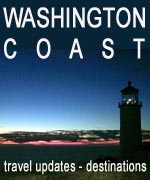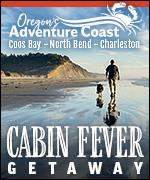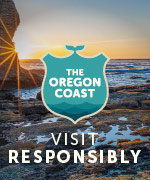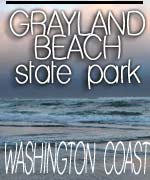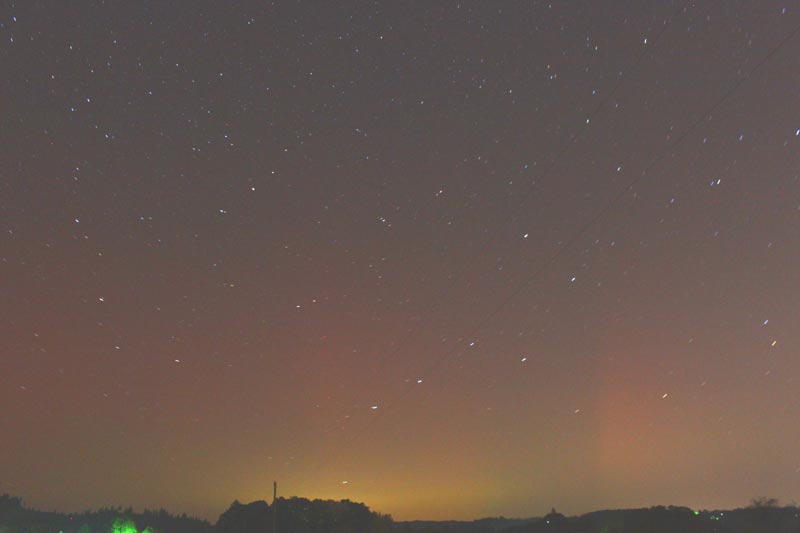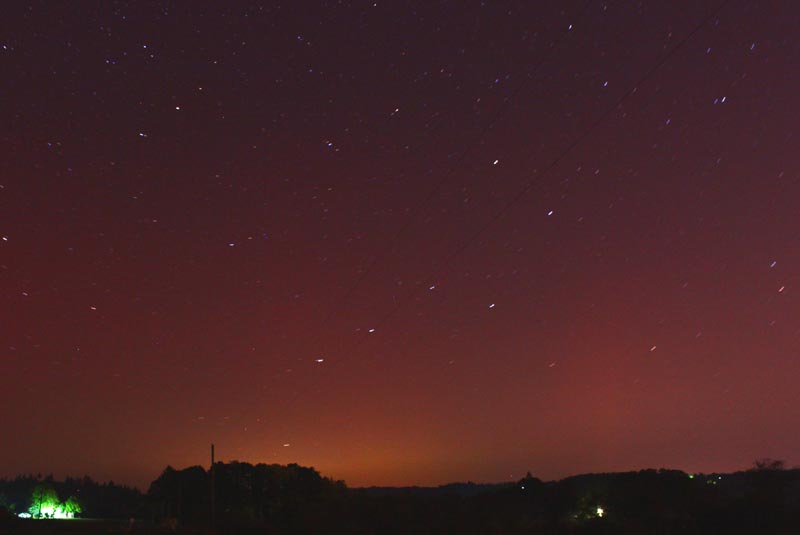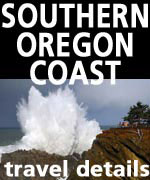Strong Solar Flare Could Bring Northern Lights to Washington, Oregon Coast
Published 10/28/21 at 6:36 PM PDT
By Oregon Coast Beach Connection staff
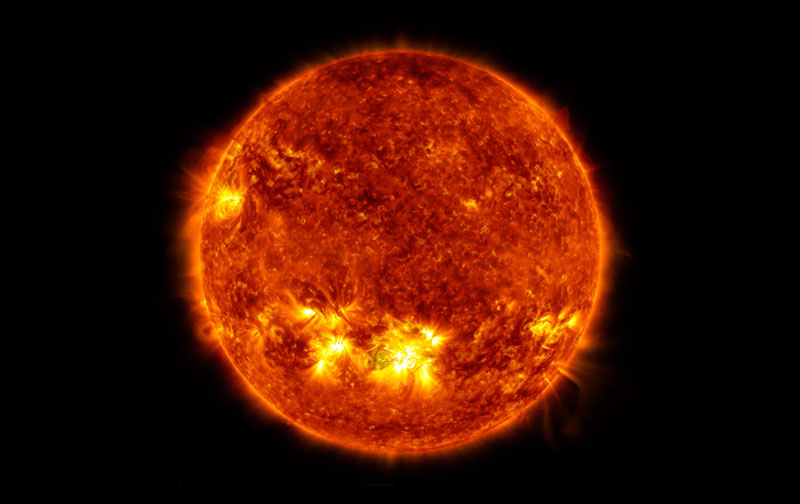
Includes exclusive listings; some specials in winter
In Cannon Beach:
Includes rentals not listed anywhere else
In Manzanita, Wheeler, Rockaway Beach:
Some specials for winter
In Pacific City, Oceanside:
Some specials for winter
In Lincoln City:
Some specials for winter
In Depoe Bay, Gleneden Beach:
Some specials for winter
In Newport:
Look for some specials
In Waldport
Some specials for winter
In Yachats, Florence
Some specials for winter
Southern Oregon Coast Hotels / Lodgings
Reedsport to Brookings, places to stay; winter deals
(Portland, Oregon) – [SEE THE UPDATES: Chances for Northern Lights Rise Along Washington, Oregon Coast 45% chance for Sat and Sun, but clouds come in Sunday ] Scientists from the U.S. Space Weather Prediction Center (SWPC) said the strongest solar flare in recent years just erupted from the sun early on Thursday, classified as an X1-class flare – the most powerful of them all. The result could be some spectacular sightings of the aurora borealis along the upper parts of the Washington coast and possibly even well down into the Oregon coast on Friday and Saturday. (Above: Thursday's flare caught by NASA)
With clear skies forecast on most of the Oregon coast and all of the Washington coast on those nights, a showing of the northern lights could be a memorable one. However, the southern Oregon coast will remain murky and cloudy on those nights, from about Reedsport southward into Brookings.
The flare, which is believed to have also created a coronal mass ejection (CME), was enough to disrupt communications in the southern hemisphere earlier today. It peaked about 7:30 a.m. west coast time.
However, predicting any aurora is still too early, according to Jim Todd, astronomer with Portland's OMSI.
“As of now, predictions are not out yet for possible aurora activities,” Todd told Oregon Coast Beach Connection. “When will the CME itself arrive? Assuming that it is Earth directed, probably on Oct. 30th or 31st. Fresh data from SOHO coronagraphs will allow a more precise forecast, so stay tuned.”
The flare caused a sizable radio blackout early Thursday in South America, which was sunlit at the time and facing the sun's best and worst impacts. It did not last long, according to NASA.
SpaceWeather.com said if the northern lights do occur here, and the Earth is in the path of the electromagnetic storm, it could seriously disrupt satellite communications for a time.
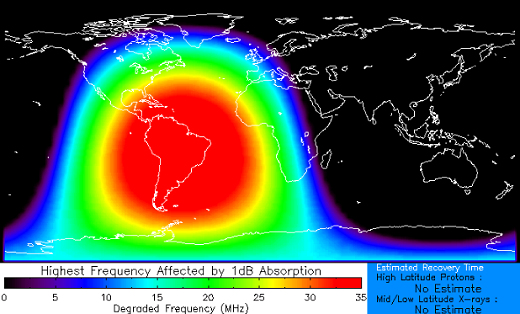
Graphic showing the radio interference in South America earlier in the day (courtesy NASA)
See Oregon Coast Weather - Washington Coast Weather
Solar flares are essentially massive eruptions from the surface of the sun, where radiation sends out charged particles into space. If the Earth is in that path, the result can be plenty of northern lights into latitudes well below the Arctic Circle. Flares are classified in a letter system. X-class are the strongest, M-class are lesser so and relatively in the middle, and the C-class storms are the weakest.
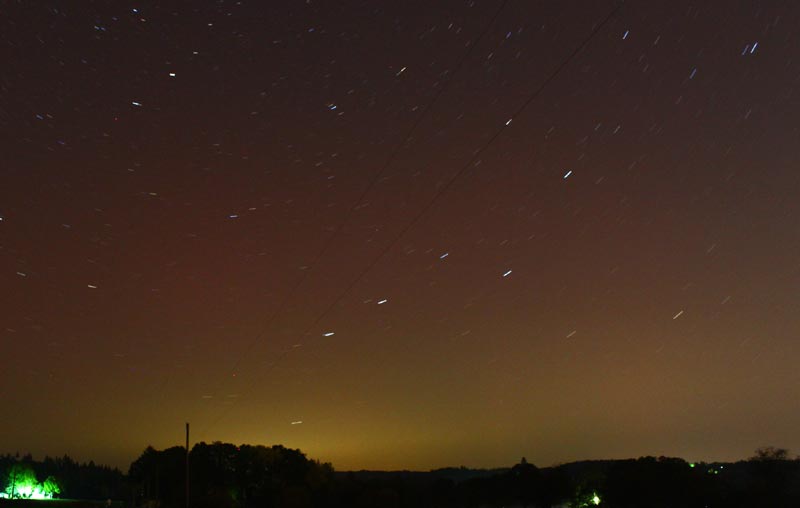
Aurora Borealis in the Coast Range
"An X2 is twice as intense as an X1, an X3 is three times as intense, etc.,” said NASA. “Flares that are classified X10 or stronger are considered unusually intense."
This particular flare came from a sunspot designated AR2887, which is facing the Earth in general. It reportedly caused two other flares in the medium range the same day before the big one.
Washington State is generally in a much better position to witness northern lights during such events, and that definitely includes the coastline.
Pay attention to the latest regional weather forecasts in your area to find updates on aurora borealis predictions, or SpaceWeather.gov. If you intend to head out to photograph the phenomenon, keep in mind you may not be able to see it with the naked eye. Often, you'll need a camera with a tripod and long exposure times, then you'll need to check the camera afterwards for any “curtains of light” that may be there.
The photos above and below were taken by Oregon Coast Beach Connection in the Coast Range and these sights were not visible, except by the camera.
Oregon Coast Hotels for this event - South Coast Hotels - Where to eat - Maps - Virtual Tours
Cannon Beach Lodging
Nehalem Bay Lodgings
Manzanita Hotels, Lodging
Three Capes Lodging
Pacific City Hotels, Lodging
Lincoln City Lodging
Depoe Bay Lodging
Newport Lodging
Waldport Lodging
Yachats Lodging
Oregon Coast Vacation Rentals
Oregon Coast Lodging Specials
More About Oregon Coast hotels, lodging.....
More About Oregon Coast Restaurants, Dining.....
LATEST Related Oregon Coast Articles
Keep an eye on road issues, traffic, only available detours. Reopens late Sunday
Salem, Oregon Traffic, Road Conditions - Traffic Cams: I-5 - Hwy 22 - ORE 221...
I-5 - Hwy 22 - ORE 221 - Willamette Valley - West Salem - Downtown Salem - Lancaster Dr Traffic. Weather cams
US Coast Guard Rescues Oregon Coast Whale Watch Vessel Disabled at Newport
The Discovery tour boat had 49 people aboard. Weather
Eugene, Oregon - Springfield Weather and Alerts | Current Conditions, Cams | ...
Weather updates and live cams for Eugene and Springfield
Bomb Found in Backpack at Sunset Beach on N. Oregon Coast
No other devices were found on the coast. Sciences
Equinox Along Oregon, Washington, Coast: Say Goodbye to Summer, Saturn's Rings
Fall begins as Saturn's go flat to our view. Astronomy. Sciences
N. Oregon Coast Rescue: Girl Resuscitated on Seaside Beach, Hospitalized
Two young adults were briefly missing in the surf, 24 hrs after Yachats tragedy. Beach safety
Man Drowns at Central Oregon Coast's Thor's Well, Near Yachats
The man fell into the infamously dangerous watery hole and died. Safety, weather
Back to Oregon Coast
Contact Advertise on BeachConnection.net
All Content, unless otherwise attributed, copyright BeachConnection.net Unauthorized use or publication is not permitted





